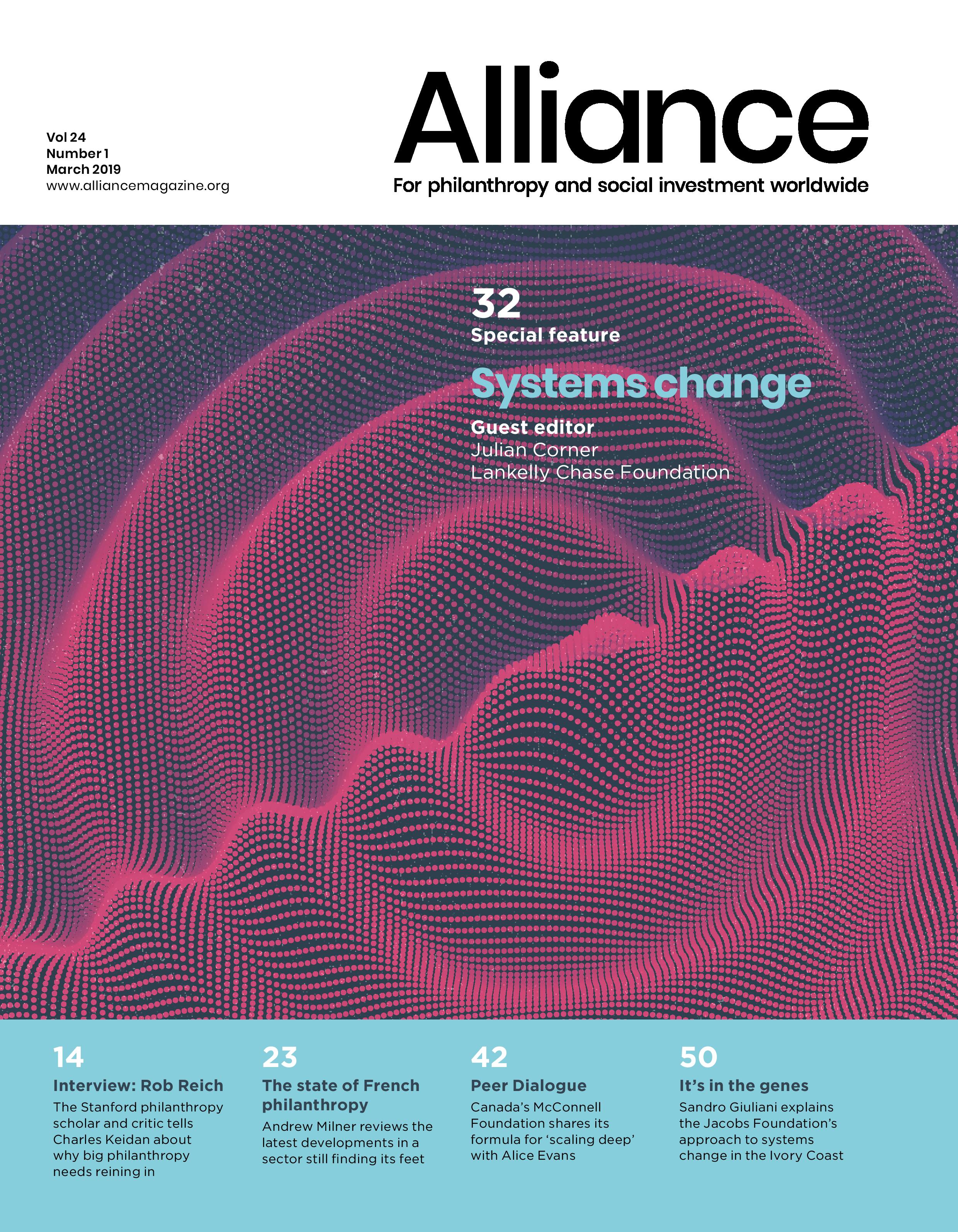Systems change is more than just a popular catchphrase, but its effectiveness depends on aligning strategies with a foundation’s institutional DNA
Is system transformation an end in itself, an effective means to achieve a strategic objective, or merely a buzzword in the philanthropy community? To answer this question from the perspective of the Jacobs Foundation, I need to go back to the year 2014, which marked the beginning of our strategy planning process.
Institutional DNA is decisive
The core question every foundation needs to answer in this process concerns its ‘institutional DNA’, which defines its business model, thematic and regional focus and operational approach to its mission. In our case, the mission is to improve the living and learning conditions of children and youth. Key elements of our DNA include our aspiration to achieve long-lasting social impact, our efforts to promote new scientific insights and our goal of making a critical difference within a clearly defined thematic and regional focus. We also have a unique understanding of the challenges facing the chocolate industry, as it has historically been a major source of our financial assets.
Four years ago, mindful of our institutional DNA, the board of trustees and the management of the Jacobs Foundation determined that if we were to live up to our ambitions, we would need to drastically reduce our funding portfolio and concentrate our resources on selected strategic priorities. Aside from our funding of global research related to the ‘science of learning’ and our programme and policy work in Switzerland, we opted to limit our international project work to a single country until 2020. As the world’s largest producer of cocoa and one of the main economic drivers in West Africa, Ivory Coast offered the most promising conditions for the foundation to achieve a long-lasting social impact by strategically aligning with the national government’s agenda and that of the global cocoa and chocolate industry.
The main advantages foundations have over other actors in the field of development, are their long-term, risk-tolerant funding, their evidence-based orientation and, most importantly, their lack of vested interest in a specific intervention.
Multiple strong partners are needed
In 2015, we launched a partnership designed to improve the living conditions of children and youth in Ivory Coast by promoting high-quality education. Over the last four years, the Ivorian government, 12 leading global cocoa and chocolate companies, 20 national and international civil society organisations and academic partners, as well as two partner foundations (the Bernard van Leer Foundation and the UBS Optimus Foundation) have joined us in an initiative known as TRECC – Transforming Education in Cocoa Communities. So far, TRECC partners and co-investors have committed a total of $85 million to be used to pilot and scale evidence-based programmes related to early childhood development (ECD), primary education and youth education, with a focus on rural areas. Our aim is to use this substantial and coordinated investment to create an ecosystem of change and drive major system transformations in the national education and nutrition policy as well as the global sustainability approach of the cocoa and chocolate industry.
Foundations are in a unique position
Instead of selecting one programme to be rolled out nationally together with the government and the industry, we systematically address the whole ecosystem. We are convinced that foundations are uniquely positioned to create and facilitate effective, independent platforms for system transformation. The main advantages foundations have over other actors in the field of development, are their long-term, risk-tolerant funding, their evidence-based orientation and, most importantly, their lack of vested interest in a specific intervention. In such an ecosystem-based approach, implementers play a vital role as well, of course, with their specific programmes and expertise. They are, however, only selected in a second step based on the specific priorities and needs of the system. In such an approach, the primary partners of foundations are not those who implement the programmes, but rather public and private decision-makers.
The role of philanthropy is not to provide resources indefinitely, but rather to encourage the formation of a local community of practice to act as an independent platform to achieve long-term system transformation.
The TRECC way
In the case of TRECC, we began by drawing up a Memorandum of Understanding with the Ivorian government aimed at improving national policies. We then conducted a global screening effort and selected evidence-based interventions that have been proven to improve ECD and the quality of education in rural areas. In a next step, we collaborated with the government and the cocoa and chocolate industry to compile a shortlist of 15 programmes (for example, the Teaching at the Right Level approach pioneered by Pratham and J-PAL) to be taken from pilot to scale in an effort to meet specific policy needs. For the government, the focus is on the education sector and multi-sectoral nutrition plan; the industry is concentrating on a pre-competitive strategy aimed at eradicating child labour.
In addition to co-funding, monitoring and evaluating individual programmes, TRECC manages a platform that brings together all the partners in the ecosystem, aligning their agendas, supporting their ability to work at scale, facilitating scientific evidence and providing management support. In our view, however, the role of philanthropy is not to provide resources indefinitely, but rather to encourage the formation of a local community of practice to act as an independent platform to achieve long-term system transformation.
What we’ve learned
Nearly four years after we set out on our journey in Ivory Coast, we are confident that system transformation is not merely a buzzword, provided that it is tackled seriously through a well-considered approach. Indeed, system transformation in our case was and is the logical consequence of country focus and impact orientation.
It has taken several years to build up local structures and relationships and to gain credibility and legitimacy with all of the relevant stakeholders. We have learned that this approach is very time-consuming and resource-intensive. However, if our hypothesis is corroborated, our approach has the potential to lead to an effective, lasting and tailor-made system transformation driven by the needs and priorities of the decision-makers concerned.
Sandro Giuliani is managing director of the Jacobs Foundation.
Email: sandro.giuliani@jacobsfoundation.org
Twitter: @sandrogiuliani4








Comments (0)